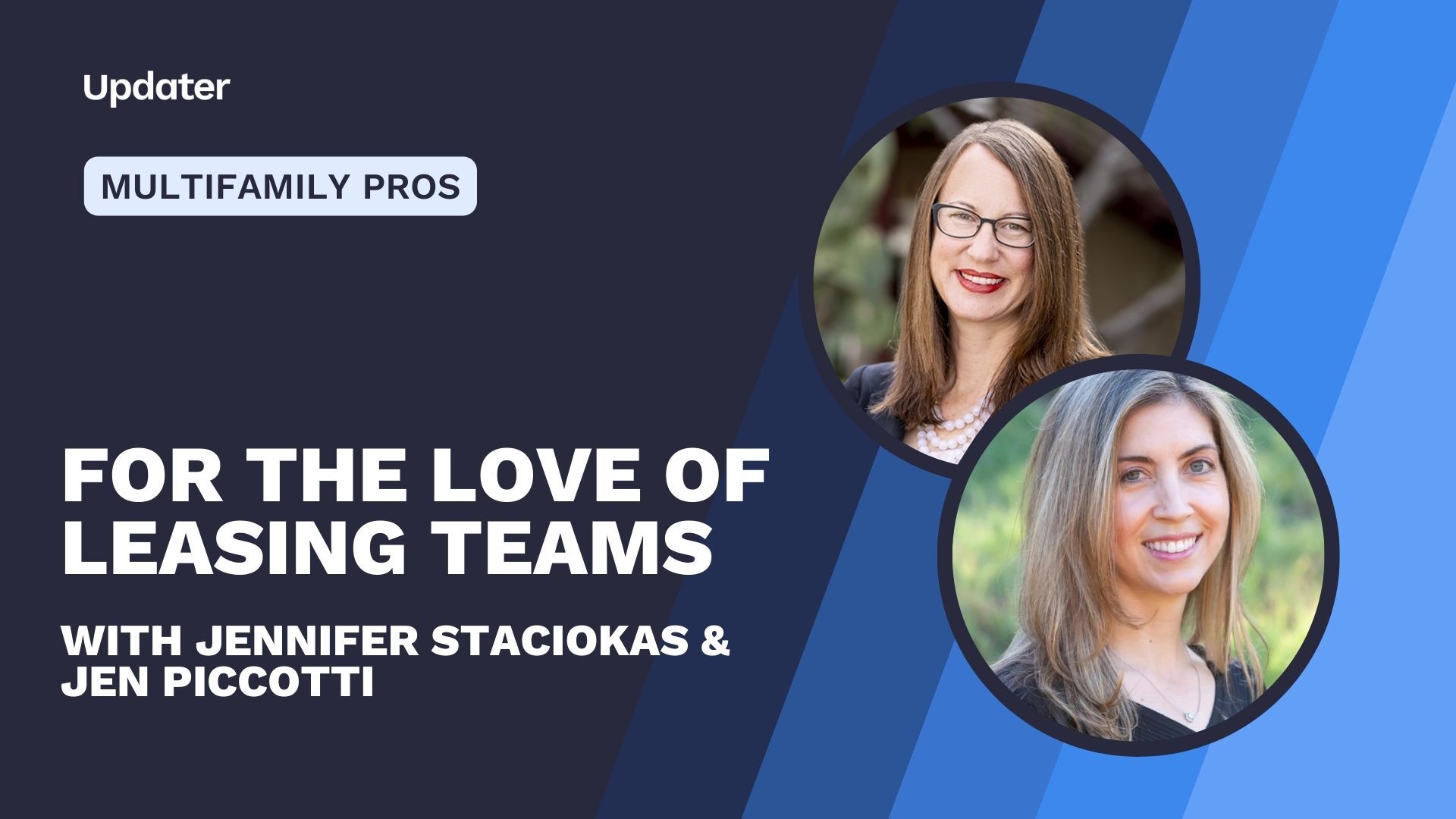5 strategies to motivate multifamily leasing teams & prevent turnover

In the world of multifamily housing, leasing teams play a crucial role as the link between residents and management’s goals. Their job goes beyond transactions – they create special experiences that turn living spaces into cherished homes. We had the privilege of discussing this with industry experts, including Jennifer Staciokas, President of Western Wealth Communities, and Jen Piccotti, President of Swift Bunny. Together, we explored the challenges, strategies, and future possibilities that shape these essential teams. Here are five key takeaways:
1. High turnover and employee dissatisfaction:
Swift Bunny partners with multifamily companies like Western Wealth to help them understand what is going to elevate their onsite teams and make their experience better. Jen Piccotti emphasized the importance of understanding employee feedback noting, “When onsite teams are doing well and feeling successful, the whole industry is taking off.”
This year, Swift Bunny conducted a study revealing a staggering 52% annual turnover rate among onsite teams. This statistic highlights a pressing industry challenge: the retention of skilled professionals. The core issue often boils down to employee discontent, triggered by problems like inadequate compensation and insufficient training.
Actionable insights:
- Launch a mentorship program to pair new leasing agents with seasoned professionals. This not only accelerates learning but fosters a sense of belonging, reducing turnover by creating a supportive environment.
- The journey towards employee retention begins early. During the interview process, engage in discussions about potential career paths to instill a sense of purpose and direction.
2. The importance of purpose and accomplishment:
A comprehensive onboarding and training process is crucial to empower new leasing agents. However, the absence of a sense of purpose and accomplishment can lead these professionals to feel disconnected from the importance of their roles. According to Swift Bunny, 31% of leasing team members express a lack of substantial achievements in their work. In contrast, Jen Piccotti highlights, “What they’re doing is one of the most wonderful things someone can do. Helping someone find their home.”
Actionable insights:
- Highlight stories where leasing agents played a pivotal role in helping individuals find their ideal homes. This connects their daily tasks to tangible outcomes, elevating their job satisfaction.
- The best leasing professionals usually aren’t the best at admin work. Lean in on their strengths as sales people to help them thrive.
3. Balancing technology and human touch:
The COVID-19 pandemic has underscored the importance of balancing technology with human interactions. While automation and technological tools streamline operations, the irreplaceable human touch is pivotal in nurturing resident relationships. Western Wealth, for instance, has harnessed technology to automate lead nurturing and social connections, enabling their onsite teams to prioritize their essential role: assisting individuals in finding their new homes.
Actionable insights:
- Incorporate AI-driven tools to handle routine inquiries, allowing leasing agents to dedicate more time to personalized interactions. However, ensure seamless transitions to human agents if complex issues arise.
- Deploy technology that lightens the administrative load on onsite teams, allowing them to excel in their core task of leasing units. Jennifer Staciokas highlights their collaboration with Updater as a seamless moving concierge service that ensures smooth move-ins for residents and onsite teams alike.
4. Specialization and career paths:
Acknowledging the multifaceted nature of leasing roles, the industry is shifting towards specialization. Recognizing individual strengths and aligning them with distinct career paths, such as sales or administrative roles, leads to higher job satisfaction. Jennifer Staciokas emphasizes this trend, “Many people that are good at leasing don’t have any interest in being an assistant manager or property manager. I think we’re going to see the industry creating career paths that focus on sales and allowing the admin work to sit in the management track.”
Research from Swift Bunny reveals that 75% of leasing agents consider their current roles less than ideal for the long term. More often than not, leasing agents are unaware of the potential career paths available within their own companies.
Actionable insights:
- Pay close attention to the unique strengths of each leasing professional and adjust their responsibilities accordingly. Offering diverse pathways for growth, from sales-focused careers to centralization, increases retention.
- Adopt the concept of “utility players,” as Western Wealth terms them. Provide additional training to versatile leasing agents, helping them to become adept at cross-functional tasks and contribute more effectively.
5. Employee growth and development:
Internal advancement is a great strategy for retaining valuable team members. By mapping out well-defined career paths, cultivating mentorship bonds, and unlocking avenues for advancement, companies can nurture loyalty and unwavering commitment. Jennifer Staciokas’ journey serves as an inspiring industry example, showcasing how someone can evolve from an onsite role to the president of a leading company.
Actionable insights:
- Collaborate with employees to chart personalized career paths within the organization. Establish mentor-mentee relationships to provide guidance, leading to not just retention but a dynamic workforce.
- Swift Bunny shared that 31% of leasing agents don’t know when there are job openings within their company. If you send out regular emails or communications about open roles – use the copy “are you or anyone you know interested in these roles?” This lets them know that you’re interested in promoting people and upward mobility.
- Don’t be afraid of losing a member of your team to an internal position. Retaining and promoting employees is so much more beneficial than having them leave anyway because they found something externally.
- Tip for leasing agents – Jennifer Staciokas encourages you to raise your hand and put yourself in the mix to ensure that you are considered for new opportunities.
We’ve learned a lot from these industry experts about improving the experience of leasing teams. By incorporating these practical strategies into your everyday operations and support systems, you open up the opportunity to uplift the entire organization’s journey – benefiting not only leaders and leasing agents, but also the residents they serve.
Looking for more insights on this topic? Click here to explore more multifamily research and resources from Swift Bunny.
More Industry Insights

6 Ways Centralized Leasing is Revolutionizing Multifamily
24 April 2024

5 proven tactics to lease more apartments over the phone
23 April 2024












